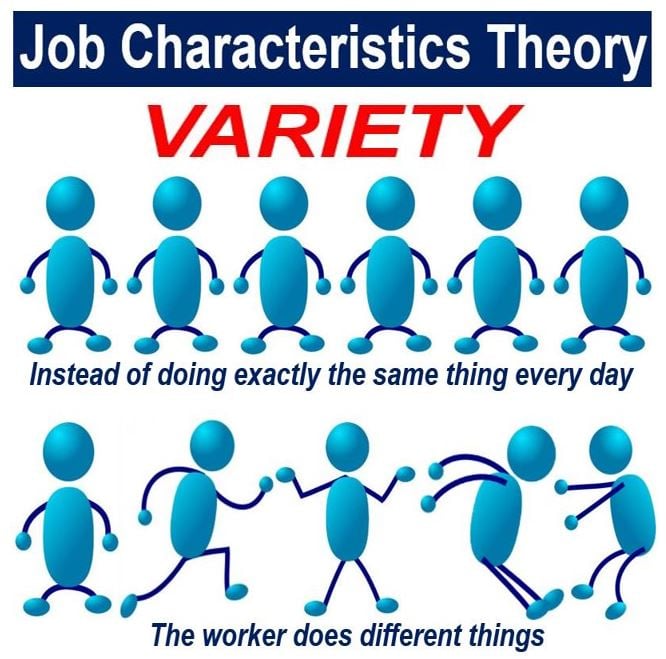The Job Characteristics Theory, also known as the Core Characteristics Model, is a theory of work design developed by Greg R. Oldham and J. Richard Hackman in the late 70s and early 80s. It is widely used as a framework to study how job outcomes, including job satisfaction, are affected by particular job characteristics.
Work design, also known as job design, is an arrangement in the workplace that aims to overcome worker alienation and job dissatisfaction that comes from mechanical and repetitive tasks in the workplace, i.e. boring jobs. The goal is to boost productivity by offering workers non-monetary rewards such as satisfaction derived from a sense of greater personal achievement.
Jobs are sometimes redesigned so that the worker is involved in the whole process of making a product. The employee likes that sense of completeness. He or she can look at the finished product and say “I made that.” Look at your own job, are you able to say “That’s what I did.”
Put simply, job characteristics theory is the idea that the way a job is designed, meaning what kind of tasks it includes, can have a big impact on how employees feel and perform at work.
Job Characteristics Theory – The 5 ‘Cores’
In the Job Characteristics Theory, the five ‘core’ job characteristics are:
– Skill Variety: the degree to which various activities are needed in the job, requiring the employee to develop a range of skills and talents.
Workers may feel that what they are doing is more meaningful when their jobs require several different abilities and skills, compared to those in elementary and routine employment.
– Task Identity: the degree to which the position requires the employee to identify and complete a piece of work all the way through to the end, so that the outcome is visible.
Most employees find their jobs more meaningful if they are involved in the whole process rather than just being responsible for part of it.
– Task Significance: the degree to which a job affects the lives of other people. The impact may be either within the organization or outside.
When a job significantly improves either the physical or psychological well-being of others, the employee feels that his or her work is more meaningful, compared to those whose work activities have a negligible effect on others.
– Autonomy: how much freedom, independence and discretion to plan out the work and determine the procedures to be undertaken does a job provide the employee?
For positions with high autonomy levels, the work’s outcomes depend on the employee’s own efforts, initiatives and decisions, instead of on the manager’s instructions or what is written in a manual.
When there is more autonomy, employees experience greater personal responsibility for their own successes and failures in the workplace.
– Feedback: how much knowledge does the employee have of the results, i.e. specific, clear, detailed and actionable data regarding the effectiveness of his or her work-related performance?
When employees receive clear and actionable information about their work performance, they have more overall knowledge of the effect of their work-related activities, and what exactly they need to do – if anything – to boost their productivity.

In large companies, management and human resources may go to extraordinary lengths to vary the mix of skills required in a job. Sometimes this may involve creating initiatives and training courses to increase skill and task variety.
Ideal combination depends on the individual
Each job has these five characteristics to varying degrees. There is no ideal combination that would make for the perfect job.
Job Characteristics Theory says that the purpose of job design is to adjust the levels of each core characteristic to optimally match the overall job with the individual performing it.
Aligning the five characteristics is important, because the employee brings psychological states to bear upon the job that affect outcomes when combined with the core characteristics.
Put simply, getting those characteristics as finely tuned to the worker type as possible helps him or her perform more effectively and successfully in the workplace.

Employees are more motivated when they have the authority to make work-related decisions. Giving input about a one’s job and how it is done is crucial for performance, productivity and motivation.
Work-related outcomes
These five core characteristics affect five work-related outcomes, which are:
- – Motivation
- – Performance
- – Absenteeism
- – Turnover
- – Satisfaction
Three psychological states
These work-related outcomes are occur through three psychological states, which are:
– Experienced Meaningfulness of the Work: the degree to which the worker experiences the job as intrinsically meaningful. Also the degree to which he or she can present his/her value to other individuals and/or the external environment.
– Experienced Responsibility of the Work: how responsible and accountable does the employee feel he or she is for the results of the work?
– Knowledge of Results of the Work Activities: does the worker know how well he or she is performing? If so, to what degree?
When a job scores highly on the five core characteristics, it will probably generate the three psychological states, which together are more likely to lead to positive work outcomes, such as greater internal work motivation, enhanced satisfaction with work, optimal work performance, and low absenteeism and turnover.
Motivating Potential Score
This tendency for higher levels of job characteristics to lead to positive outcomes can be formulated by the MPS (Motivating Potential Score).

The MPS (Motivating Potential Score) is a summary index which represents the extent to which the characteristics of a job foster internal work motivation. A low score suggests that the employee won’t experience high intrinsic motivation from the job. According to Job Characteristics Theory, that job should be redesigned.
Video – What is Job Characteristics Theory?
Job Characteristics theory looks at how to change what a worker does, to make his or her job more motivating, and also improve his or her job satisfaction.
